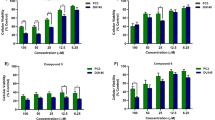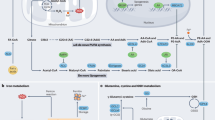Abstract
Prostate stroma can regulate the growth and metastasis of prostate cancer through the tumor–stromal cell interactions. Thus, small molecules that modulate the tumor–stromal cell interactions will have a chance to become new antitumor drugs. In the course of our screening of the modulators, we isolated three new natural compounds, NBRI16716A (1), NBRI16716B (2) and NBRI16716C (3), from the fermentation broth of Perisporiopsis melioloides Mer-f16716, although compound 2 was already reported as a chemical degradation product of isotriornicin. Compounds 1 and 2 inhibited the growth of human prostate cancer DU-145 cells in the coculture with human prostate stromal cells (PrSCs) more strongly than that of DU-145 cells alone. Furthermore, both compounds showed antitumor effect against xenograft models of DU-145 cells and PrSCs in vivo.
Similar content being viewed by others
Log in or create a free account to read this content
Gain free access to this article, as well as selected content from this journal and more on nature.com
or
References
Grossfeld, G. D., Hayward, S. W., Tlsty, T. D. & Cunha, G. R. The role of stroma in prostatic carcinogenesis. Endocr. Relat. Cancer 5, 253–270 (1998).
Tuxhorn, J. A., Ayala, G. E. & Rowley, D. R. Reactive stroma in prostate cancer progression. J. Urol. 166, 2472–2483 (2001).
Kawada, M., Inoue, H., Masuda, T. & Ikeda, D. Insulin-like growth factor I secreted from prostate stromal cells mediates tumor-stromal cell interactions of prostate cancer. Cancer Res. 66, 4419–4425 (2006).
Kawada, M., Inoue, H., Arakawa, M. & Ikeda, D. Transforming growth factor-β1 modulates tumor-stromal cell interactions of prostate cancer through insulin-like growth factor-I. Anticancer Res. 28, 721–730 (2008).
Kawada, M. et al. A microplate assay for selective measurement of growth of epithelial tumor cells in direct coculture with stromal cells. Anticancer Res. 24, 1561–1568 (2004).
Kawada, M., Momose, I., Someno, T., Tsujiuchi, G. & Ikeda, D. New atpenins, NBRI23477 A and B, inhibit the growth of human prostate cancer cells. J. Antibiot. 62, 243–246 (2009).
Kawada, M., Inoue, H., Usami, I. & Ikeda, D. Phthoxazolin A inhibits prostate cancer growth by modulating tumor-stromal cell interactions. Cancer Sci. 100, 150–157 (2009).
Kawada, M. et al. Leucinostatin A inhibits prostate cancer growth through reduction of insulin-like growth factor-I expression in prostate stromal cells. Int. J. Cancer 126, 810–818 (2010).
Frederick, C. B., Szaniszlo, P. J., Vickrey, P. E., Bentley, M. D. & Shive, W. Production and isolation of siderophores from the soil fungus Epicoccum purpurascens. Biochemistry 20, 2432–2436 (1981).
Frederick, C. B., Bentley, M. D. & Shive, W. The structure of the fungal siderophore, isotriornicin. Biochem. Biophys. Res. Commun. 105, 133–138 (1982).
Frederick, C. B., Bentley, M. D. & Shive, W. Structure of triornicin, a new siderophore. Biochemistry 20, 2436–2438 (1981).
Acknowledgements
We are grateful to Dr K Isshiki and Dr N Sakata (Mercian Corporation Bioresource Laboratories) for their valuable discussions. We also thank Dr R Sawa and Ms Y Kubota (Microbial Chemistry Research Center) for analysis of HRESI-MS and NMR measurements, and Ms K Adachi and Ms E Satoh for their technical assistance. This work was supported in part by a grant-in-aid from the Ministry of Education, Culture, Sports, Science and Technology of Japan.
Author information
Authors and Affiliations
Corresponding author
Rights and permissions
About this article
Cite this article
Kawada, M., Someno, T., Inoue, H. et al. NBRI16716A, a new antitumor compound against human prostate cancer cells, produced by Perisporiopsis melioloides Mer-f16716. J Antibiot 63, 319–323 (2010). https://doi.org/10.1038/ja.2010.42
Received:
Revised:
Accepted:
Published:
Issue date:
DOI: https://doi.org/10.1038/ja.2010.42
Keywords
This article is cited by
-
Novel approaches for identification of anti-tumor drugs and new bioactive compounds
The Journal of Antibiotics (2018)
-
Notes for genera: Ascomycota
Fungal Diversity (2017)
-
Small molecules modulating tumor–stromal cell interactions: new candidates for anti-tumor drugs
The Journal of Antibiotics (2016)
-
Intervenolin, a new antitumor compound with anti-Helicobacter pylori activity, from Nocardia sp. ML96-86F2
The Journal of Antibiotics (2013)



